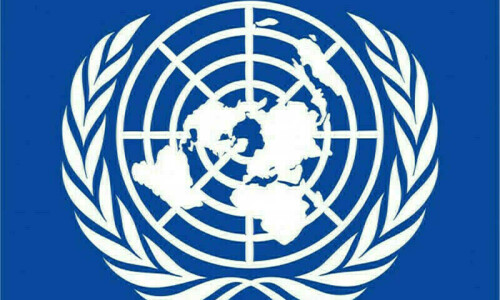RAMALLAH: Palestinian president Mahmud Abbas has decided to appoint respected academic Rami Hamdallah as his new prime minister who will be tasked with forming the next Ramallah-based government.
The decision was made public late on Sunday on the last day of a deadline to find a successor to Salam Fayyad, who resigned in mid April following months of tension with Abbas.
Washington hailed the nomination of Hamdallah, who was widely expected to tread a similar path to Fayyad, and Israeli pundits also welcomed the move, describing him as a moderate pragmatist.
“President Abbas has asked me to form a new government, and I have accepted,” Hamdallah told AFP late on Sunday.
“The government will be formed in the coming days,” he said, confirming that most of the serving ministers would remain in their posts, although he would bring in a new finance minister.
The 54-year-old, who is considered close to the ruling Fatah movement, is the head of Al-Najah University and secretary general of the Central Elections Commission.
Hamdallah was born in Anabta village near the northern town of Tulkarm and has a doctorate in applied linguistics from Lancaster University in northern England.
Under Palestinian Basic Law, he now has an initial three weeks to form a new government, which can then be extended for another two if necessary.
“We congratulate Dr Rami Hamdallah, the next prime minister of the Palestinian Authority,” Secretary of State John Kerry said in a statement overnight.
“His appointment comes at a moment of challenge, which is also an important moment of opportunity,” he said.
Israel gave no official response to the announcement but pundits described him as a figure that would be acceptable to the West who would not pose any internal threat to Abbas.
“Israeli officials see Rami Hamdallah as a moderate and a pragmatist who will follow the same political line as his predecessor,” army radio said, describing him as someone who “knows how to speak to the West”.
“Rami Hamdallah is close to Mahmud Abbas, he won't overshadow him. He is more of a manager and not really a political leader, whereas Salam Fayyad appeared more and more like a rival to Abbas,” it said.
Unnamed Israeli sources quoted by Haaretz newspaper described Hamdallah as “pragmatic” vis-à-vis Israel but someone who was unlikely to be able to shape the political map.
“Hamdallah is considered moderate and pragmatic as far as Israel and the peace process goes but it is doubtful that he will have any influence in the foreseeable future,” it said, noting also that he had “developed professional contacts with many Israelis” over the years.
Abbas began consultations to form what he said would be a unity government on April 27 in accordance with a long-delayed reconciliation deal between his Fatah movement and its Islamist Hamas rival.
But the five-week period allocated for completing such a task expired at midnight on Sunday, meaning Abbas had to make an interim appointment until the formation of a unity government.
“Rami Hamdallah is a national patriot and an independent and we hope that he can lead the (new) government for three months to give us an opportunity to form a united government with Hamas,” said Amin Makhoul, head of the Fatah Revolutionary Council.
“The appointment of Hamdallah was necessary before (Fayyad's term in office) expired on June 2 after we were not able to reach an agreement with Hamas,” he told AFP
“We hope we can reach an agreement with Hamas soon about a unity government,” he said.
Establishing a unity government and holding elections were the main aims of a Hamas-Fatah reconciliation deal which was signed two years ago, but never implemented.
Hamas, which rules Gaza, and Fatah, which dominates the West Bank government, had welcomed the resignation of Fayyad as an opportunity to push ahead with the long-delayed reconciliation deal.











































Dear visitor, the comments section is undergoing an overhaul and will return soon.